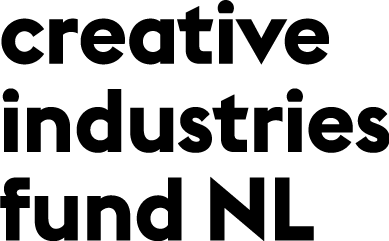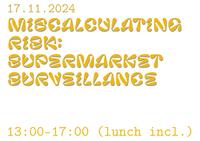Date: 17.11.2024
Time: 13:00-17:00 CET (lunch included)
Location: Varia (Gouwstraat 3)
Participation: email registration required
In continuation of the Miscalculating Risk: Policing Technologies event, in this session we will start a collective research thread around supermarket surveillance technologies together with Sanne Stevens.
While inflation is at its highest since 1975, and costs of living are pushing people over the edge, supermarkets report record profits and are prioritising the fight against shoplifting, by a plethora of measures among which an investment in AI to detect theft. The turn to shoplifting AI was picked up by media outlets in The Netherlands when supermarket chain Jumbo (second largest supermarket in NL) sent out a statement that it would start to deploy AI driven video surveillance. This would concern software by the French company Veesion, which claims to have developed a ‘gesture-based recognition software’ to detect shoplifting ‘automatically in real-time’. As soon as this software detects a ‘suspicious’ movement, the store manager gets an alert, along with a video clip of the activity.
Veesion is by far not the only outlet offering AI to detect shoplifting – a quick search shows many others, including Scylla which apparently includes the option of facial recognition to identify ‘repeat offenders’, Anavid and Dragonfruit AI, which boasts State-of-the-Art Pose Detection. These forms of AI video surveillance might just be another AI trend coming to your neighbourhood supermarket soon.
Meanwhile, experts point out potential harms and negative impacts. For example, what the AI understands to be ‘suspicious’ activity might very well be any non-normative behaviour that has nothing to do with shoplifting and cause great stress for people who are for whatever reason moving around differently – for example individuals with disabilities or physical or mental health issues. We know that AI tends to reproduce the structural racism of society, another concern hard to ignore. Meanwhile, it was discovered that Veesion's ‘automated’ software program was in reality performed by underpaid workers in Madagascar who are watching the footage and flagging suspicious behaviour. Another example of ‘fake’ AI.
During this session, we want to explore all these sides of AI shoplifting technologies; the promises, the drivers and motivations and ideological assumptions behind the technology, but also how it works out in practice, who is impacted and in what ways. The Veesion AI software deployed by the Jumbo supermarket is a perfect local case study – close to us, in our streets, but at the same time connected to a web of global deployment, general cost of living crisis, the ideologies of automation, the power structures upholding the AI hype and the criminalisation of those, once again, disproportionately targeted and impacted.
In order to do this, we would like to create an Algorithmic Ecology from the Jumbo shoplifting AI, which we will use as a tool to guide not only a collective research endeavour, but also to start the conversation on possible intervention, disruption or refusal.
If you would be interested to join this research group, please email info@varia.zone with 1-2 sentences introducing yourself and your interest in the topic before the 8th of November.
Sanne Stevens (Justice, Equity and Technology Table) is a researcher, trained facilitator and advisor with many years of experience working with civil society organisations and media organisations in field of technology, digital safety and Internet freedom. Sanne is a Table Co-Director in the Justice, Equity and Technology Project.
This series falls under Varia's Counter-Colonial research thread and is supported by the Creative Industries Fund NL.

